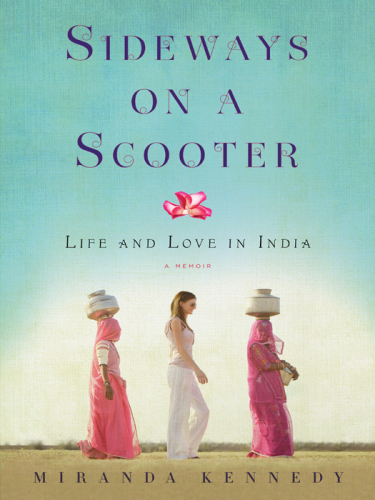
Sideways on a Scooter
Life and Love in India
- اطلاعات
- نقد و بررسی
- دیدگاه کاربران
نقد و بررسی

March 21, 2011
Abandoning New York, 20-something freelance writer Kennedy embarks on a trip to India, and ends up staying for five years. She leads readers on a sensual and smart voyage, sharing her insights on food, culture, Bollywood (what she sees as medieval morality plays), and the multiple rigors of daily life. Kennedy constructs her story around the lives of the women in her life, while simultaneously reflecting upon her own fractured personal and professional circumstances. She discusses the devoted yet at times strained relationship with her servants (Radha, a poor Brahmin, and Manheesh, a member of the sweeper caste) as well as the hurdles faced by her two single middle-class girlfriends, dealing with India's conservative, family-centric culture. Kennedy dives into such topics such as the lingering caste system, extreme poverty, the byzantine relationships between the sexes, and the pressure on women to marry and have children. She zigzags agilely between these women's stories and her own, shedding an intimate light on life in a rapidly developing but at times unchanging India.

January 15, 2011
Chronicle of the five years the author spent in India defining herself as "a journalist, an adventurer, a woman."
In the early 2000s, Kennedy was a restless 20-something journalist living and working in New York. Unwilling to wait for her ideal job to find her, she decided to "kick [her] way out of the claustrophobia of normalcy" and become what she most wanted to be—a foreign correspondent. The author relocated to India, where a British great-aunt had served as a missionary and where her own parents had lived during the early years of their marriage. The transition to her new home in New Delhi was difficult and at times painful; she was a feringhee (foreign) woman on her own in a city that did not receive many international visitors and in a culture that did not look favorably upon single females. Kennedy writes how "[e]yes followed me everywhere unless I was safely ensconced inside a five-star hotel." She discovered that the only way she could gain any respect (and find more permanent lodgings for herself) was to present herself as a married woman with a husband abroad. In this guise, Kennedy began a process of cultural assimilation that eventually brought her into contact with the unforgettably colorful Indian women whose lives are at the heart of her story. Some, like her maid Rhada, were poor; others, like her neighbor Geeta, came from more privileged classes. Ethnicity, caste and cultural traditions separated these women, but the more Kennedy came to know them, the more she found how their traditional concerns with love and marriage were—however much as she tried to disavow it—also her own. Part personal account, part extended reportage on an ancient culture in the throes of modernization and part nonfiction narrative of manners, the book offers an intimate look at the nature, problems and limits of both Western and non-Western female freedoms in a country where "nothing is sharper than the tug of tradition and family."
A generously observed memoir of an American finding her way in India.
(COPYRIGHT (2011) KIRKUS REVIEWS/NIELSEN BUSINESS MEDIA, INC. ALL RIGHTS RESERVED.)

November 1, 2010
An interesting complement to Lisa Napoli's forthcoming Radio Shangri-La, this book details the author's five years in Delhi, where she worked for National Public Radio. Kennedy profiles six women she knew to show how much (and how mistakenly) the West takes for granted both its own values and the easy modernization of the subcontinent. Great for book clubs that liked Deborah Rodriguez's Kabul Beauty School--or anything about India.
Copyright 2010 Library Journal, LLC Used with permission.

March 15, 2011
NPR reporter Kennedy moved to India as a twentysomething early in the twenty-first century, seeking adventure and escaping what she perceived as a monotonous journalism career in NYC. Whether participating in a bumpy reporting tour of Afghanistan or hopping a plane to tsunami-stricken Sri Lanka, she was living her dream as a foreign correspondent, jokingly referring to herself as the thick-skinned Super Reporter Girl. Here she has gathered the experiences of the Indian womenfriends, neighbors, and servantsshe incidentally met along the way, with whom she generously employed that same fearlessness to broach sometimes painful subjects, such as love, sex, and marriage in a ritualistic, caste-driven society. Kennedys inadvertent research uncovered that, while some Indians may have acquired a taste for McDonalds, few other so-called Western ideals have pierced the surface of this deeply traditionaland often, where women are concerned, restrictivecountry. The talented Kennedy deftly peppers her respondents experiences with astounding facts about income, population growth, and marriage practices, and the extremely caring portraits of her friends ultimately dovetail with her personal story.(Reprinted with permission of Booklist, copyright 2011, American Library Association.)




دیدگاه کاربران